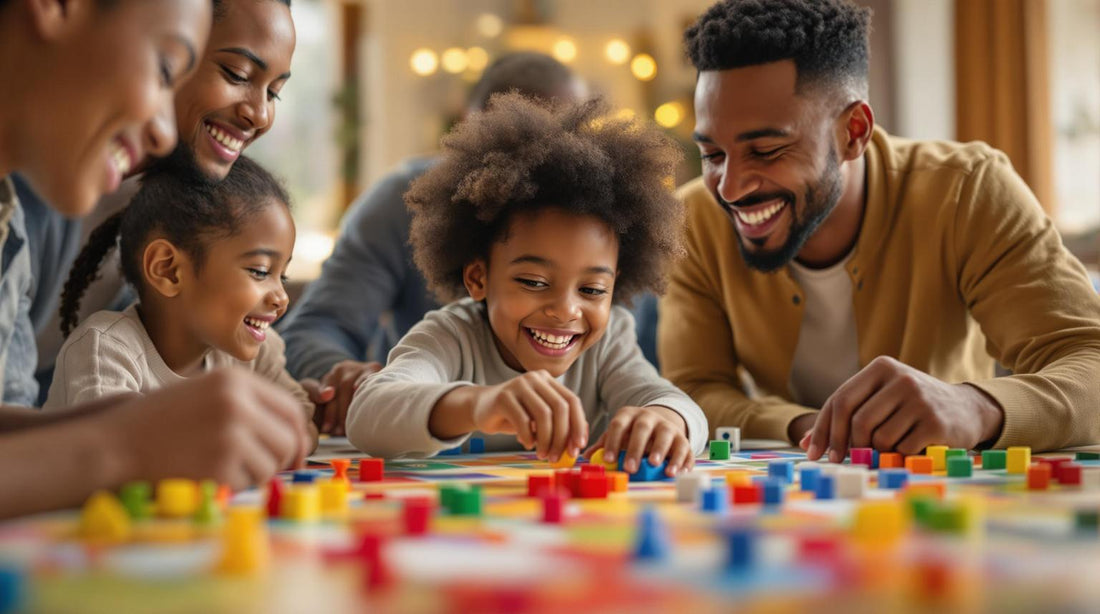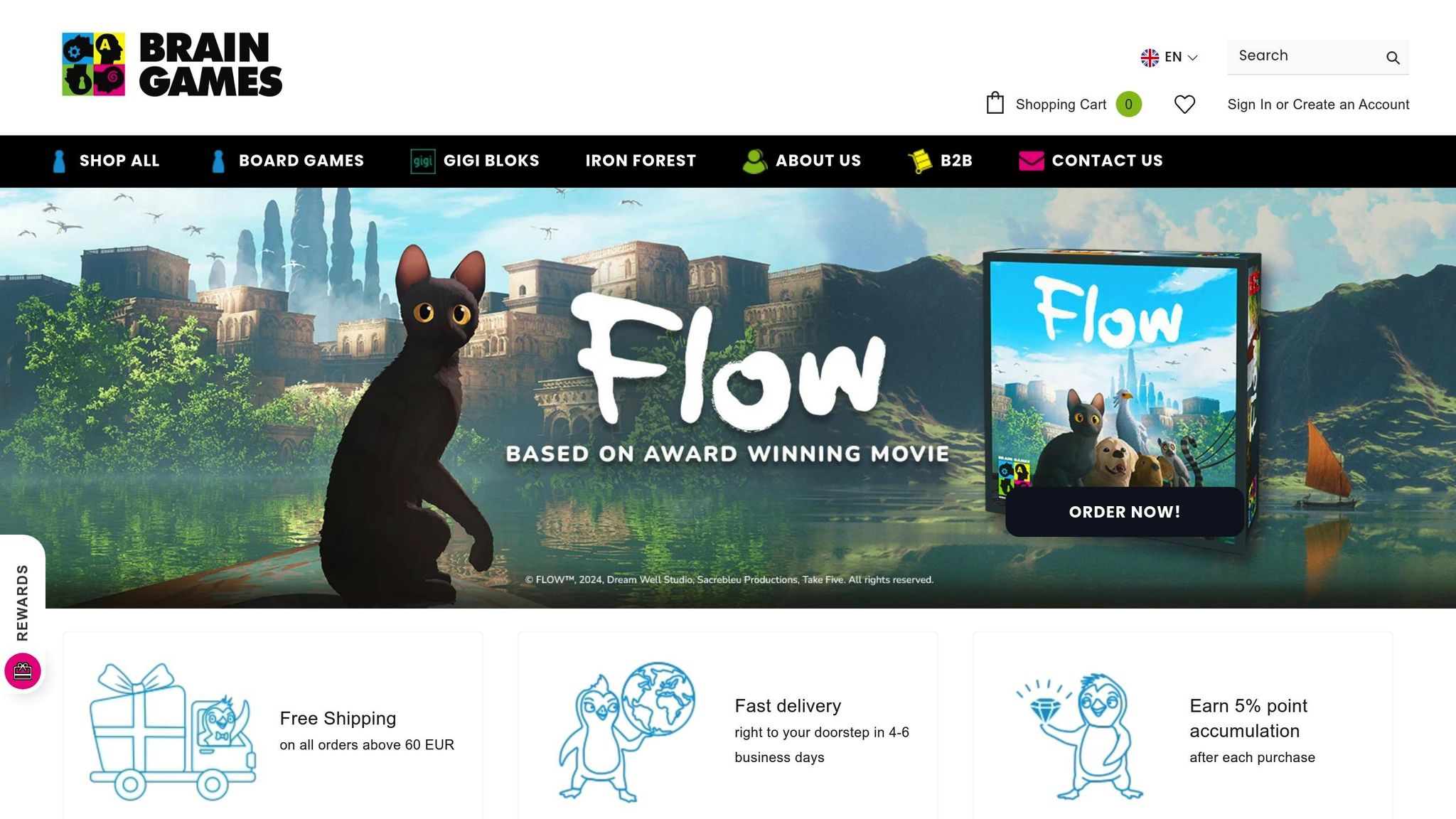Discover the Best Board Games for Every Player

Ultimate Guide to Social Skills Board Games
Social skills board games are a fun way to improve communication, teamwork, and emotional understanding for all age groups. These games provide structured, low-pressure environments to practice important interpersonal skills like expressing emotions, active listening, and collaboration. Whether you're a parent, teacher, or just looking to connect with others, these games can help build confidence and strengthen relationships.
Key Benefits of Social Skills Games:
- Improved Communication: Games like Codenames and Just One focus on clear expression and active listening.
- Teamwork and Collaboration: Cooperative games like Pandemic or Forbidden Island teach players to strategize and solve problems together.
- Emotional Awareness: Games like Dixit help players recognize emotions, build empathy, and navigate feelings.
- Confidence Building: Structured play with clear rules provides a safe space to practice social interactions.
Best Games by Age Group:
- Ages 3-5: Hi Ho Cherry-O, Candy Land, First Orchard
- Ages 6-11: Pictionary Junior, Race to the Treasure, Dixit
- Ages 12-17: Pandemic, Wavelength, The Resistance
- Adults: Codenames, Decrypto, Mysterium
Quick Tips for Choosing and Playing:
- Match games to the age group and specific skills you want to develop.
- Create a distraction-free play space with good lighting and comfortable seating.
- Use gameplay as an opportunity for reflection and discussion.
Social skills board games are not just about fun - they're tools for personal growth and connection. Start playing today to build stronger communication and relationships!
Social Skills Board Games Review
Why Play Social Skills Games
Social skills board games help develop interpersonal abilities through interactive play and structured activities.
Improving Communication and Teamwork
These games are great tools for practicing effective communication in a hands-on way. Players get to:
- Clearly share their ideas
- Actively listen to others
- Offer and accept constructive feedback
- Collaborate to reach shared objectives
Take cooperative games like Pandemic or Forbidden Island as examples. They require players to strategize together, pool resources, and make collective decisions. This promotes clear communication and teamwork, skills that easily carry over into everyday situations. Beyond that, these games also help players navigate and understand emotions.
Exploring Emotions
Social skills games create a safe environment to explore emotions - both your own and others’. They help players:
- Recognize facial expressions and body language
- Build empathy by considering different perspectives
- Handle frustration or disappointment
- Celebrate the achievements of others
Some games are specifically designed to teach emotional recognition, helping players identify and name various emotions. This strengthens emotional awareness and vocabulary through fun, interactive play.
Boosting Social Confidence
Along with communication and emotional skills, these games also build social confidence by offering:
- Clear rules that set expectations
- Opportunities for gradual skill development
- Immediate feedback during play
- A relaxed, supportive setting
- Freedom to make mistakes and learn from them
- Practice in resolving conflicts
- Improved turn-taking and leadership opportunities
Games like Story Cubes encourage players to share ideas and speak in groups. Over time, this helps participants feel more comfortable and confident in social settings.
Different age groups benefit in unique ways:
| Age Group | Social Skills Gained |
|---|---|
| Children (3-11) | Basic communication, turn-taking, rule-following |
| Teens (12-17) | Emotional understanding, peer connections, group dynamics |
| Adults | Leadership, conflict resolution, teamwork |
Best Games by Age Group
Check out some of the best board games to help develop social skills, tailored to different age groups.
Games for Ages 3-5
| Game Name | Key Social Skills | Playing Time |
|---|---|---|
| Hi Ho Cherry-O | Taking turns, counting together | 10–15 minutes |
| Candy Land | Following rules, managing outcomes | 15–20 minutes |
| First Orchard | Teamwork, shared goals | 10–15 minutes |
| Sequence for Kids | Patience, friendly competition | 20 minutes |
These games introduce preschoolers to basic social interactions in a fun, engaging way.
Games for Ages 6-11
| Game Name | Social Skills Focus | Player Count |
|---|---|---|
| Pictionary Junior | Communication, creativity | 4–8 players |
| Labyrinth Junior | Strategy sharing, patience | 2–4 players |
| Race to the Treasure | Team planning, cooperation | 2–4 players |
| Dixit | Emotional expression, storytelling | 3–6 players |
Perfect for elementary-aged kids, these games encourage teamwork, empathy, and creative problem-solving.
Games for Ages 12-17
| Game Name | Social Strategy | Duration |
|---|---|---|
| Pandemic | Crisis management, leadership | 45–60 minutes |
| Just One | Group consensus, clear communication | 20–30 minutes |
| Wavelength | Perspective taking, debate | 30–45 minutes |
| The Resistance | Social deduction, persuasion | 30 minutes |
Games in this category challenge teens to think critically, work together, and articulate their ideas. For instance, Wavelength encourages players to consider different perspectives and explain their reasoning effectively.
Games for Adults
| Game Name | Professional Skills | Group Size |
|---|---|---|
| Codenames | Clear communication, team leadership | 4–8+ players |
| Time's Up! | Public speaking, quick thinking | 6–12 players |
| Decrypto | Information sharing, team strategy | 4–8 players |
| Mysterium | Interpretation, non-verbal communication | 2–7 players |
These games are great for developing advanced communication and leadership skills, making them ideal for both casual and professional settings. Whether you're strategizing in Decrypto or interpreting clues in Mysterium, there's something here for everyone.
sbb-itb-1ed942f
Picking the Right Game
Match Games to Age Level
Choosing games that fit the player's age helps develop social skills. For younger kids, go for games with straightforward rules that teach turn-taking and sharing. Older kids might enjoy games that promote richer interactions, like negotiation and teamwork. For teens and adults, look for games that involve deeper social dynamics, encouraging critical thinking and effective communication. Once you've considered age, focus on the specific social skills you'd like to improve.
Target Specific Social Skills
After ensuring the game matches the age group, narrow your options by focusing on the social skills you'd like to develop. For example, if communication is your goal, try games with word-based challenges or tasks requiring detailed descriptions. For teamwork, pick games that involve shared objectives. Games with role assignments can help build leadership, while story-driven games can encourage empathy.
Here’s a quick guide to help you match games with social skills:
| Social Skill | Game Features to Look For |
|---|---|
| Communication | Word challenges and description tasks |
| Cooperation | Shared goals and teamwork-focused gameplay |
| Leadership | Role assignments and team coordination |
| Empathy | Character-driven stories and narrative gameplay |
Check Group Size and Interest
Finally, make sure the game fits your group size and interests. Think about how many players will join and whether they prefer competitive or cooperative play. Picking a game that aligns with the group’s preferences ensures everyone stays involved, making social interactions more meaningful.
Getting the Most from Social Games
Talk About the Game
Use gameplay as a way to spark meaningful conversations. Take time to discuss experiences during natural pauses or after the game ends. Ask open-ended questions to encourage reflection, like: "What strategy worked best for your team?" or "How did it feel to negotiate with other players?"
Here’s a simple framework to guide your discussions:
| Discussion Phase | Focus Areas | Example Questions |
|---|---|---|
| Game Experience | Immediate reactions | "What was the most challenging moment?" |
| Social Skills | Skill application | "How did you work together to solve problems?" |
| Real Life | Practical connections | "When might you use these communication skills?" |
These conversations naturally transition into creating an ideal play environment.
Set Up a Good Play Space
The environment plays a big role in how much players enjoy social games. A well-prepared space can make all the difference. Here’s what to consider:
- Good lighting: Make sure everyone can clearly see the game pieces and each other’s faces.
- Comfortable seating: Arrange chairs so players can easily interact and reach game components.
- Minimize distractions: Silence phones, turn off TVs, and avoid background noise.
- Easy access to materials: Keep game pieces, cards, and instructions within everyone’s reach.
Having snacks or drinks nearby is a bonus. Don’t forget about room temperature - keeping it comfortable (around 70-72°F) helps everyone stay focused and engaged.
A well-thought-out setup ensures players can fully enjoy the experience.
Keep Playing Regular and Fun
Consistency is key to building engagement with social games. Try these tips to keep things fresh and enjoyable:
- Start with shorter sessions (about 30 minutes) and gradually extend as interest grows.
- Mix it up - rotate between familiar games and new ones to keep everyone excited.
- Focus on having fun rather than winning. Celebrate creative solutions and good teamwork.
- Take short breaks between rounds to maintain energy and focus.
Aim for 2-3 game sessions per week, but adjust based on the group’s energy and schedules. A relaxed, supportive atmosphere encourages natural social interactions and keeps everyone coming back for more.
Where to Buy Games
Choosing the right store can make all the difference when shopping for social skills games.
Brain Games

For a curated selection of board games that entertain while encouraging social interaction, Brain Games is a great choice. Here’s what they offer:
- Expertly Chosen Games: Their staff carefully selects games designed to help build social skills.
- Satisfaction Guarantee: Not happy with your purchase? You can return or exchange it within 2 weeks.
- Loyalty Perks: Earn 5% back in points on every purchase, plus enjoy a 10% discount when you subscribe to their newsletter.
Here are a few popular options:
| Game Title | Price | Best For |
|---|---|---|
| Flow | $24.95 | Strategic cooperation |
| Voila | $18.71 | Quick social interaction |
| Pikoko | $18.71 | Team communication |
| Doodle Rush | $14.96 | Creative expression |
They also offer free shipping on orders over $65, with delivery in 4–6 business days.
Other Game Stores
If you’re looking for more options, consider these alternatives:
- Local Game Stores: These often host game nights, provide expert advice, and let you walk out with your purchase the same day.
- Educational Supply Stores: Perfect for finding developmental games, often with teacher discounts and classroom-friendly options.
- Online Marketplaces: Browse multiple brands, read customer reviews, and compare prices all in one place.
Make sure to check each store’s policies and rewards programs to get the best deal on games that encourage social skills.
Wrapping It Up
Let’s pull together the main takeaways from this guide on how social skills board games can make a real difference.
Key Highlights
Playing these games regularly helps improve communication, boosts emotional awareness, and builds self-confidence. The structured nature of gameplay provides a safe environment to practice and develop interpersonal skills that are useful in daily life.
| What You Gain | How to Get There |
|---|---|
| Better Communication | Games that require teamwork and discussion |
| Improved Emotional Awareness | Role-playing or cooperative games |
| Greater Confidence | Consistent, structured play sessions |
Starting Your Journey
Getting started is easier than you might think:
- Pick Your First Game: Choose a game that fits the age group and focuses on a specific social skill you'd like to work on.
- Stick to a Schedule: Plan regular sessions, like after school or on weekends, to make it part of your routine.
- Reflect After Playing: Take 10–15 minutes to talk about what everyone learned or experienced during the game.






